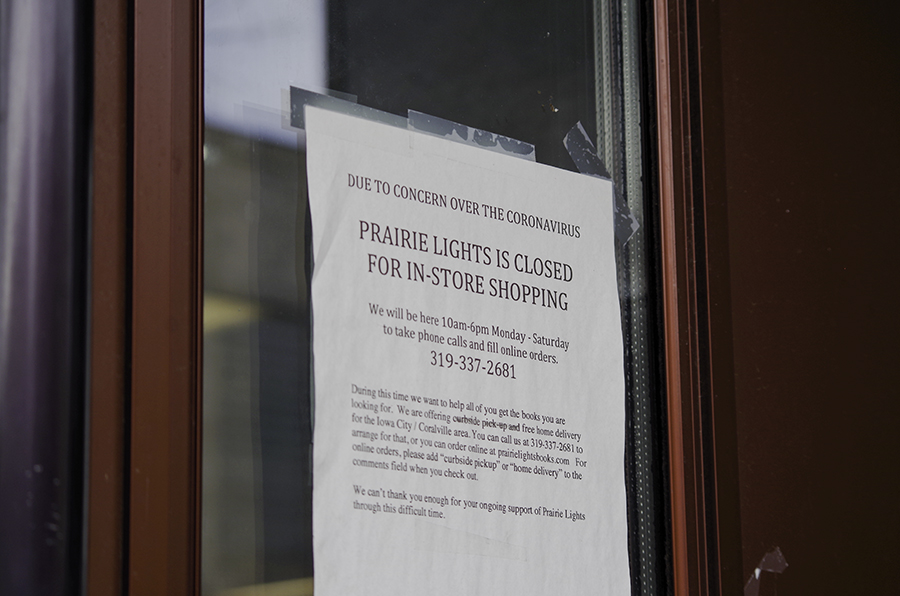Shockwaves: the long-term implications of COVID-19
The ongoing pandemic has impacted everyone, but how has it shaped society as a whole?
As COVID-19 cases rise across the state of Iowa, many businesses are altering operations in order to keep employees and patrons safe.
The ongoing COVID-19 pandemic has not only greatly impacted our world, but forced everyone to reshape their way of life. Many people are ready for life to go back to normal. But will it? Will our society ever go back to being what it was before? Or will these lockdowns have permanent effects?
There are many positive aspects of working or going to school online as opposed to in-person. There is no need to worry about commutes, traffic or leaving something at home. However, new problems arise, such as the dependability of your internet, or loud family members and other distractions. While working online was a rarity before all this, it has become a normal part of everyday life. Many jobs, like teaching, retail and healthcare have some aspects that require or work better in person, and people in these professions will try to go back as soon as possible. However, even when social distancing rules have been repealed, some people might prefer working at home, and might not want to go back to an office.
People have learned to be more self-reliant and have had to depend less and less on other people or services for entertainment. Eating at restaurants, going to movies or parties, shopping at stores or malls and so many other things have become rarities or stopped completely, forcing people to do these things themselves. When restaurants are not open, people need to learn how to cook themselves, and many people have learned how to do home repairs that they would have hired someone else to do in other circumstances. Since restaurants have been closed, many people have done more cooking. Even when there are other options, ordering things online is easier than driving to a grocery store, finding the item on a shelf, waiting in line to purchase it, and then taking it back home. Especially once you have been accustomed to ordering things online, going to stores can seem like a hassle or more work than necessary.
Before the pandemic, the U.S. economy had had a record low unemployment rate of 3.5 percent. When lockdown started, that number skyrocketed to 14.7 percent in April. However, after things have started to open back up, the rate has dropped and is currently at 6.9 percent. Since then, the US economy has been turned upside down, and different companies have been affected disproportionately. In April through June of 2019, total Amazon sales were at $63.4 billion, a 20 percent increase from a year earlier. During the same months of 2020, total Amazon sales had increased 40 percent, earning a total of $88.91 billion. And while Amazon has prospered, other companies have been devastated. Small local businesses, as well as businesses that rely on social gatherings, such as theaters and corporations that handle live entertainment or travel, have been devastated, leading to a drastic increase in unemployment. In total, nearly 100,000 businesses have closed permanently, which represents 60 percent of all businesses that have been shut down due to COVID-19.
While many restaurants and other businesses have opened up again, they are still not able to operate at full capacity. Many stores have long lines outside because only a few people are allowed in the building, and many restaurants are open for carry-out only. While this is an improvement, it is still not optimal. The economy is currently in a recession. The longer that lockdowns last and the stricter they are, the worse things will get, and the more people will go unemployed. However, things have already begun to improve in areas with more lenient regulations. Since lockdowns have been lifted, many people have been able to go back to work, and regain some sense of normalcy.
Your donation will support the student journalists of West High School. Your contribution will allow us to purchase Scholarship Yearbooks, newsroom equipment and cover our annual website hosting costs.

(she/her) Vivian Polgreen is a senior at West and it is her third year working on staff. She is the news editor and co-managing editor for the online publication....

Gwen is a photographer and online entertainment editor on WSS. This will be their third year on staff. In their free time Gwen enjoys cuddling with their...



